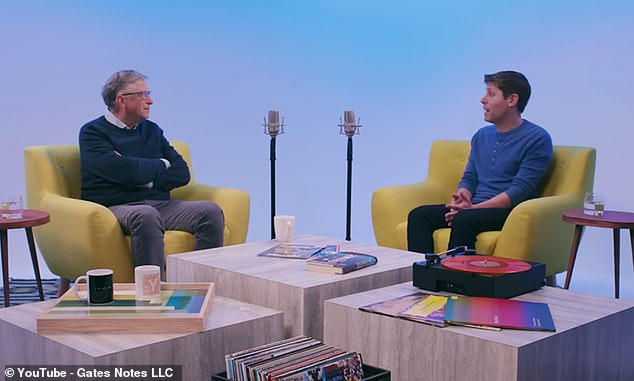Bill Gates Reveals Three Jobs Most Immune to AI Takeover
While Microsoft co-founder Bill Gates remains optimistic about the social benefits of artificial intelligence, even the billionaire mogul now fears that AI could take his job.
The candid joke came during a recent podcast conversation with Sam Altman, CEO of OpenAI, whose company is responsible for the AI-powered chatbot ChatGPT.
Over the years, Gates has maintained that the three best career paths for recent college graduates are in alternative energy, health biosciences and the advancement of artificial intelligence itself – but “billionaire philanthropist” is notably not on that list.
“I might even lose my job,” Gates said on his podcast “Unconfuse Me with Bill Gates.”
“If the machine says to me, ‘Bill, go play pickleball, I have malaria eradication. You’re a slow thinker,'” he worried, “then it’s philosophically confusing.”
Over the years, Microsoft co-founder Bill Gates has maintained that the three best career paths for recent college graduates are those in alternative energy, health biosciences and the advancement of artificial intelligence (AI) itself – but notably, ‘billionaire philanthropist’ does not stand out on that list

While Gates remains optimistic about the social benefits of AI, even the billionaire mogul now fears it could take his job. “When the machine says to me, ‘Bill, go play pickleball, I have malaria eradication. You’re just a slow thinker (…) it’s philosophically confusing’
‘I was very skeptical,’ Gates said of AI in this conversation with Altman in the January 11, 2024 edition his podcast. ‘I didn’t expect ChatGPT to be this good.’
He expressed his own bewilderment at how AIs with a “big language model” like ChatGPT can process and imitate complex textual information such as the works of William Shakespeare, with Altman saying his team shared that confusion.
“When OpenAI built GPT-1, they didn’t have a deep understanding of how it worked or why it worked,” Altman admitted.
According to Altman, the company now aims to ‘interpretability research” to more fully unravel all the intricacies and complexities that machine learning and AI training alone have done, beyond the eyes of the original programmers.
Gates has increasingly focused both his podcast and blog, “Gates Notes,” on the future promise and ethical dimensions of AI.
“We now have a better idea of what kinds of jobs AI will be able to perform on its own and what jobs it will serve as a co-pilot,” Gates said in a message about his predictions for 2024.
“2023 was the first time I used AI for work and other serious reasons, not just to mess around and parody lyrics for my friends.”
“And it’s clearer than ever how AI can be used to improve access to education, mental health care and more,” Gates continued. “It drives me to ensure that this technology helps reduce – and doesn’t contribute to – the terrible inequality we see around the world.”
One healthcare example Gates cited was that AI chatbots could make it easier for patients to learn about and better assess their personal risks for HIV, noting that “for many people, talking talking to a doctor or nurse about their sexual history can be uncomfortable.”
Gates has put his money on the idea that healthcare, alternative energy jobs and AI are the most important and viable sectors for the future of work.
This summer, the billionaire’s energy company, TerraPower, will build a new nuclear power plant in Wyoming.
“Making it clean, affordable and reliable will be essential to the fight against poverty and climate change,” Gates told a graduating class of students.
“Life sciences,” he told those same graduates, will remain a viable and valuable career path because it is “ripe with opportunity to help people live longer, healthier lives,” a set of skills and products that will always be in demand. .
Today, Gates says, he still feels the same way about the promise of AI, though he concedes that we “need to make smart investments now” to ensure that “AI can make the world a more just place.”
“Whether AI can help us have less war, be less polarized – you would think it should boost (human) intelligence,” as Gates told Altman in his recent podcast.
“So I would love to see people working on the toughest human problems, like whether we can get along,” Gates added. “I think it would be a huge positive if we thought the AI could help people get along.”
